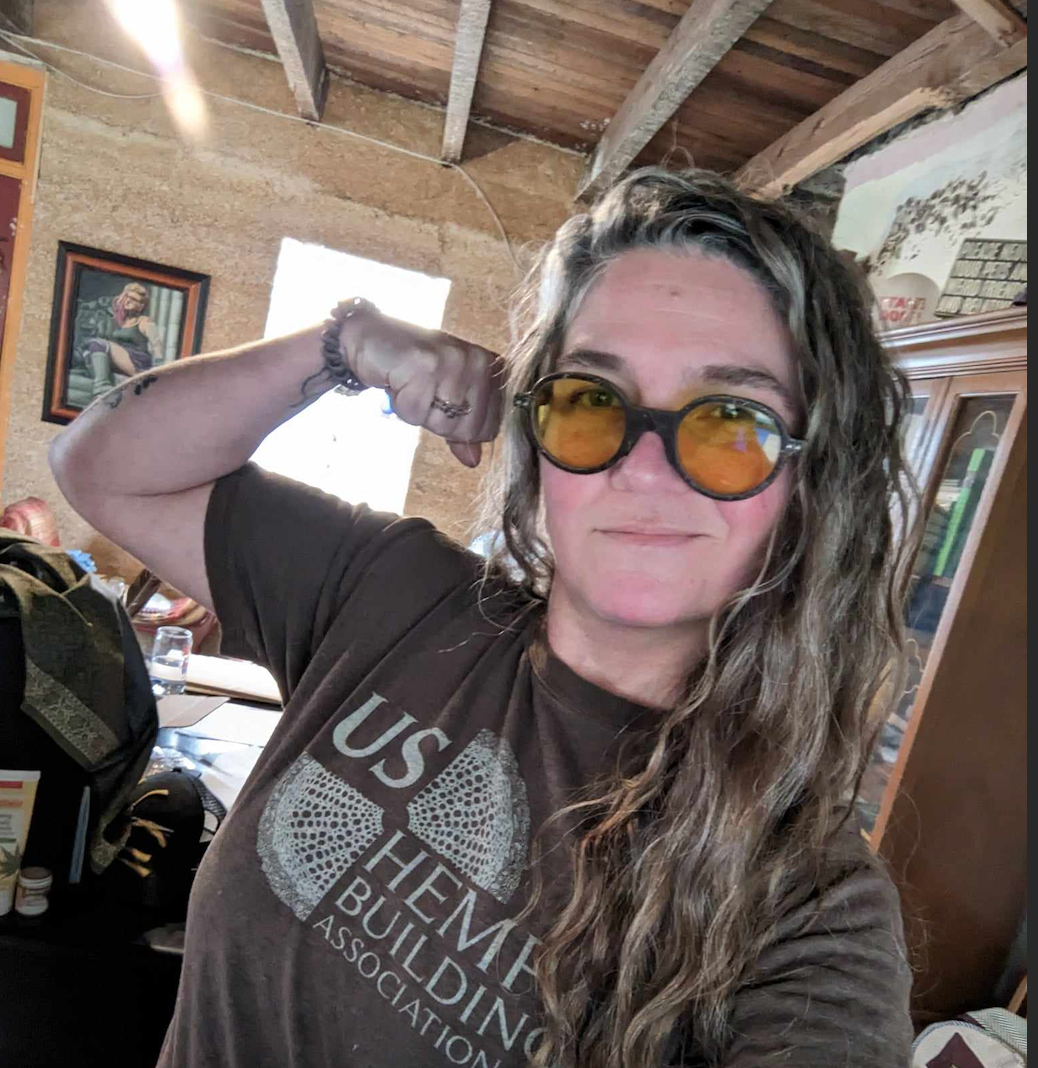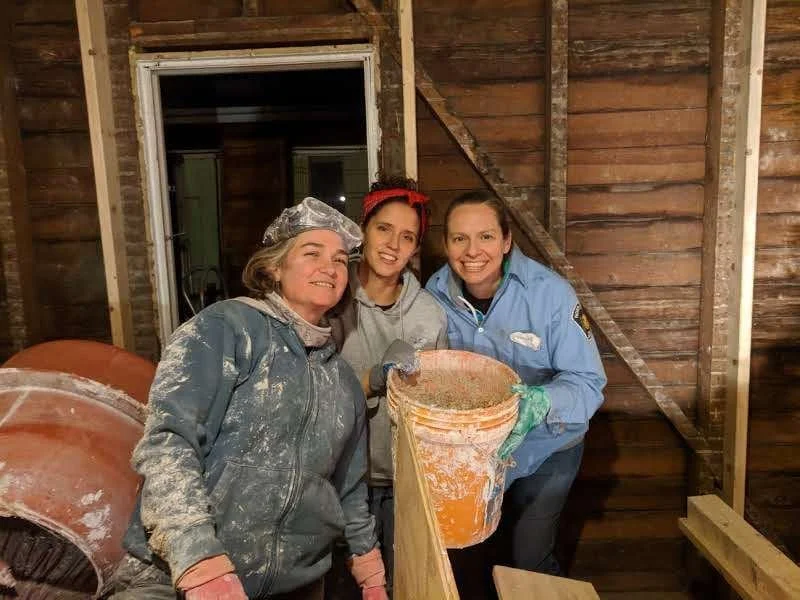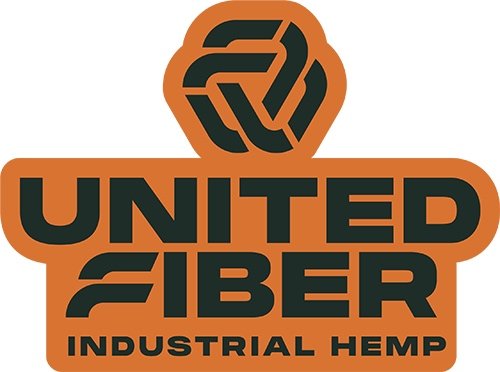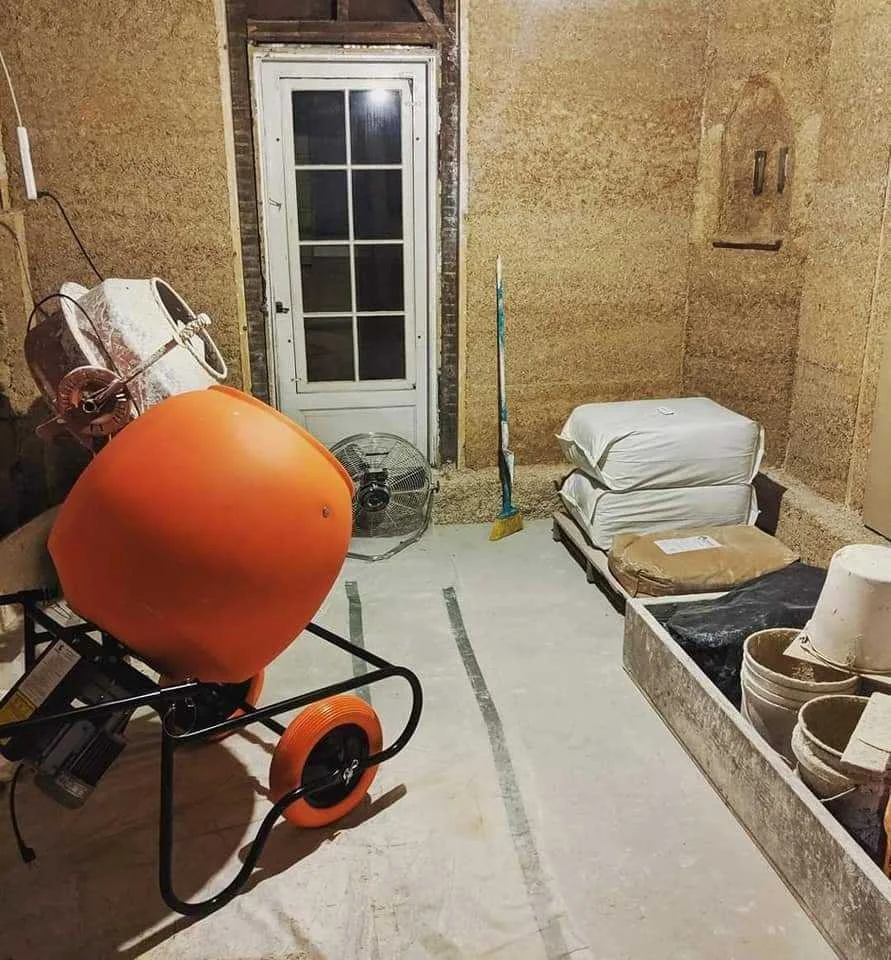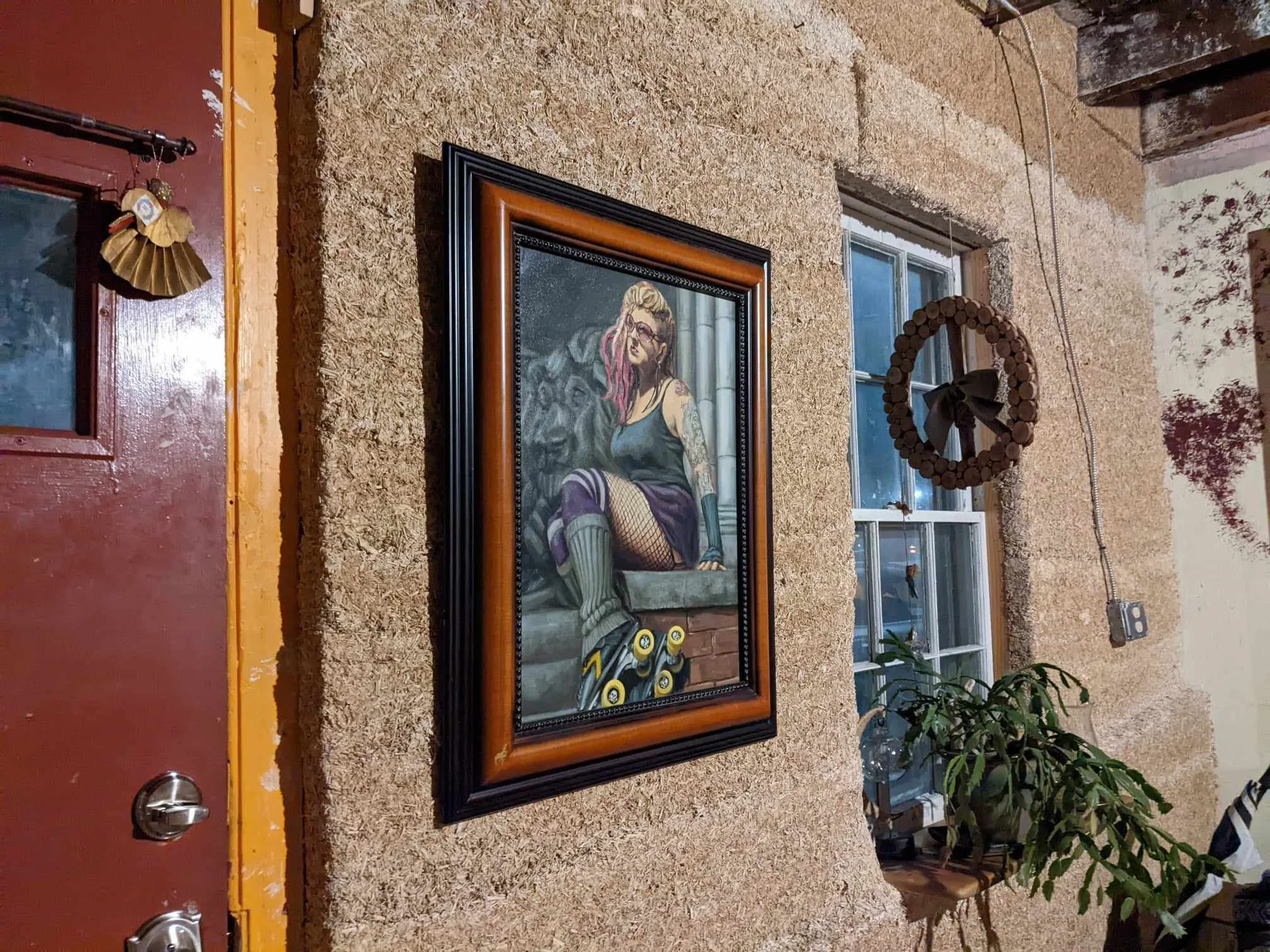Hempcrete is a Winner Against Historic Floods
Gayle Killen poses in front of her hempcrete wall in her historic home in Ellicott City, MD. Photo courtesy of Gayle Killen
By Elizabeth Lunt
Once again hemp-lime is proving to be a resilient material, this time in a flood zone. Homeowner Gayle Killen says the remediation she has done to her historic home in Ellicott City, MD, has saved the house from flood damage where others have not been so lucky.
Killen had been looking for a house with “good bones” that she could bring life to with natural building materials, she said, and when she saw Ellicott City, she fell in love with the beautiful old structures nestled in the valley. Her house is a duplex with the original half - constructed in 1809 as the city icehouse - built of stone. The other half was added in 1888 of balloon-framed timber which has studs from the foundation all the way up to the roofline.
Killen, a defense contractor, said she has been studying and experimenting with building for decades. She bought the historic property in 2010, and has worked for years to protect and preserve her home. She said she now has evidence — after three “thousand year floods” — that her efforts to preserve her home with hemp-lime have paid off.
Despite concerns about fire spreading quickly in a balloon-framed house, water has been her nemesis in preserving the historic structure. In September 2011, 7.7 inches of rain fell in a matter of hours, damaging buildings further down the hill and causing significant damage to Killen’s basement. The urgency of wanting to strengthen the house for the future led her to explore which natural materials she could use to protect the house.
She had been studying with natural builder Sigi Koko who worked mostly with strawbale, but was aware of hemp-lime buildings around the world. Killen became convinced through her research that it was the material to protect her home, but she couldn’t get any. She focused on landscape management to redirect water flow and continued her research..
Then, in July of 2016 another devastating flood — 6.6 inches of rainfall — hit Ellicott City. The road washed away and floodwater poured through the old coal shoot and gutted Killen’s workshop in the stick frame side of the house. All the home’s systems — central AC, furnace, hot water tank — were coated in sewage wastewater. Four feet of sediment filled the basement.
The front of the house was “exposed and gutted,” Killen said, and she was forced to do all the renovations that she’d been thinking about. She frantically made calls even as Chinooks were flying overhead pulling out over 200 cars from the river. “I was a crazy panicked person standing in the middle of a disaster so I had to figure it out,” Killen recalled. She called hemp builders all over the world.
By that time Chicago-based US Heritage Group was selling Canadian hemp hurds and their own binder, Killen said, and she ordered a couple of pallets. At first she experimented mixing by hand and putting the hemp-lime around the base perimeter where the floor of the foundation meets the wall - an especially vulnerable spot, she said, where dissimilar materials meet. She also re-did the electric, placing all outlets four feet or higher from the ground, changing the hot water to a tankless system on the first floor, moving the washer-dryer, and making changes to protect all the home’s systems. A TESLA Solar roof and home battery storage is another big move towards resilience for the home.
Killen (L) poses with friends Erika and Christine who lent a hand. Photo courtesy of Gayle Killen
A so-called “thousand-year-flood” washes through Ellicott City in 2011.
By 2018, Killen had upgraded to a small bell mixer in the basement and put hemp-lime around the whole perimeter of the foundation. She also installed it between the two combined sections of the house. In May, she got a call at work that another flash flood - 8 inches in two hours - was underway. The water was so dangerous that she had to wait at the top of the hill until it receded before she could get to her house. When she did, she said, it was “bone dry.” She had her evidence, and her house was spared further damage.
The worksite in Gayle Killen’s home during the hempcrete installation. Photo courtesy of Gayle Killen
Water, she said, had gotten in only one place: where she had left a window open on the first floor. When it came in, the hemp-lime held it and then “breathed it out within three weeks” Killen said, showing her that the hemplime worked and how it would perform. “That is all the information I needed to say ‘ok it's hempcrete for the rest of the house!’” Killen says now.
Killen says the wall facing busy Historic Main Street is far less noisy with hemp-lime insulation buffering sounds. Photo courtesy of Gayle Killen
Killen’s experience has turned her into a hemp-lime activist. It has been traumatizing, she said, to have information that can save people from losing their homes and face naysayers and insurance companies who encourage people to put their life savings into rebuilding with “cheap and toxic” materials that will only fail again.
“I was getting a lot of mockery for using hemp,” Killen said, from construction professionals asking if she could “smoke her walls,” and it was affecting her mental health. Knowing her home was protected, she turned her attention to learning more. She has found support from the US Hemp Building Association, and attended a training from Steve Allin in Ireland in 2022 on using hemp-lime on historic stone structures.
She says she can breathe easier now knowing that her home is secure, and she is taking time off from work to focus on completely renovating the house. It’s going to be “hempcrete all the way up the whole house” she said. Her vision is of a fully non-toxic, high-performing, efficient and safe home where she can educate others about the solution she has found. The whole point of owning a home is to have something that lasts and persists, Killen said. She is focused on how she can make it both beautiful and enduring for centuries.
“My story is one of resilience,” she said. “We need to help people understand hempcrete will last centuries.”
Please Support Our Classified Advertisers
(To find out more about advertising CLICK HERE).
Help Wanted:
Publications
Hemp Building Directory 2023 - Guide to the International Hemp Building Industry
“Hemp Buildings - 50 International Case Studies” by Steve Allin
Green Builders
Hemp Building Research and Training
Enrolling now Hemp Build School Masterminds online and IRL for Homeowners and Professionals
Hearts of Mercy Sponsors Hemp Building Research at Kansas State University
Terra Vida Academy - Natural Building School in Vernonia Springs, OR
Hemp Hurd (shivs)/Hemp Fiber/ Hemp Microfiber
PROducing Sustainable Fibers for Environmentally Conscious Consumers - Prairie PROducers
Grown in USA: Hemp and Fiber specialists at Complete Hemp Processing
Hempcrete installers/Insulation subcontractors
Lime Binder
Hemp Batt Insulation/Supplies
Hemp Wall Panel Products
Preorder your hempcrete tiny house from Sativa Building Systems
Panel solutions from Homeland Hempcrete
Hemp Blocks
Professional Associations

